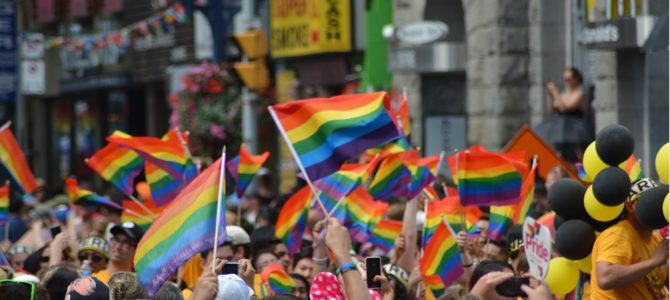
Many people in the media, including multiple left-wing celebrities, reacted in outrage on March 29 that the 2020 Census would not include LGBT individuals.
Sarah Silverman declared: “This is real handmade[s] tale shit. Unacceptable. I need to punch a pillow in the fucking face right now. Ok what do we do” in response to Alyssa Milano’s tweet, “This is infuriating and un-American.” Kathy Griffin too tweeted out in outrage only to delete the tweet shortly after. The story that caused this firestorm was from NBC News titled, “LGBTQ Americans Won’t Be Counted in 2020 U.S. Census After All,” but it was published March 29th 2017. As NPR reported on the same date of this year, couples living together will be asked if they are same or opposite-sex married or unmarried partners.
This does not appear to have calmed the outrage, however. Meghan Maury, policy director at the National LGBTQ Task Force argued, “The Census controls billions of dollars in federal funding, determines our representation at the state and federal levels, and impacts scores of other programs like how our school districts are drawn.” She further said, “The Trump administration appears to be hellbent on erasing LGBTQ people, but the reality is we are a significant part of the population. We’re here, we’re queer, we’re not going anywhere. We deserve to be counted in the Census.”
The focus seems to be on the idea the Census will not specifically ask individuals if they belong to the ever-growing categories typically under the umbrella of “LGBT.” An example of this concern is expressed by Ronald Lewis, a single gay man quoted by NPR: “If this is about how resources are spent or given to communities and we are talking about the LGBTQ community, not everyone is married or in a relationship.” The article argues that the lack of an LGBT specific identity question means, “there are no reliable national data about how many LGBT people live in the U.S. that can inform public policy.”
After adding a pink sticker with questions about her own gender identity to the 2010 Census form, Cecilia Chung, a senior director at the Transgender Law Center, who is a transgender woman said, “You know, these are all labels … But if we don’t have the proper labels when we try to look at the picture, there will be a lot of missing pieces, like jigsaw puzzles.” In 2020, she adds, “even with same-sex couples recognized on the census, there’ll be a lot of other people in the LGBT community missing from the picture of America.”
The question that arises from my point of view is why sexual or gender identity needs to be collected in the first place. The argument is that data is required for appropriate funding and resources for LGBT Americans, but that begs an additional question as to why LGBT-specific government programs are required as well. There are no special circumstances within the range of federally funded government programs that would be different for a gay or transgender person. There is no need for segregated services, housing, shelters, education or other government welfare assistance programs either. In short, there is no real reason LGBT should feel they need the government to care for them individually.
In truth, LGBT programs and studies are outdated and rely on strict definitions and assumed social circumstances that are unverifiable and unsustainable. Unlike other characteristics, sexual orientation and gender identity are self-defined and self-reported. There is no consistency in how “gender identity” is defined at all, let alone in a category useful for data collection.
While I challenge the idea that it is necessary to know how many same-sex couples, married or otherwise, there are in the country, it makes absolutely no sense to count the number of single individuals who identify as gay. Certainly, if LGBT are “erased” by not being specifically identified, so are straight or cis people who also lack an opportunity to express their sexual orientation or gender identity.
I find it strange that a movement that has dedicated itself to the concept of “equality” for so many years is advocating for segregation on what should be a very simple count of the American population. I am a gay married man, but when filling out forms I simply select “married.” For years I selected “single” as well.
There is no reason to include the fact that I am gay, or my spouse is a man. Under legal or social equality, it shouldn’t matter anymore than I am Jewish, and he is Atheist. It seems ridiculous that I have to designate that I am in a same-sex marriage and directly implies my marriage must be different than an opposite-sex marriage, otherwise no distinction would be needed.
The core of this concern, in my view, revolves around the reality that the LGBT Left has constructed its entire system of civil rights and validation on the foundation of ever-changing political sands. By their insistence on referring absolutely every aspect of LGBT life to a governmental authority, they have made themselves vulnerable to the whims of a temperamental government. For them, the smallest change in political balance threatens everything they have worked so hard to put into place. Do they really want to be counted by a government they firmly believe wishes to intentionally deny them their civil rights?
A primary reason I oppose much of the political agenda of the LGBT Left is due to the fact I do not want my rights and freedoms determined by the federal government, of which I have very little influence. The federal government can impose sweeping benefits, regulations and protections and can repeal them just as easily. I, as a citizen, am much better off focusing my political efforts on my local and state governments which move more slowly and can be more easily manipulated by public voice.
This illustrates a major flaw in LGBT thinking, in which rights, protections and benefits are defined separately from the majority population in the first place. As is well-known, identifying as a homosexual male in no way impacts my ability to own a firearm or property, vote, travel freely between states or practice my religion. But every time I am segregated out by a specific legal or government standard defining me as different from the majority population, I risk exposure to political vindictiveness. By their very efforts at ensuring equality, they put in practice a system that makes me, as an individual, vulnerable to inequality.
It must be clearly stated that if LGBT Americans are to ever be included in the general population they must cease all efforts at legally and socially segregating themselves from that population. Regardless of the belief in a specialized need for resources, funding or other intangible government benefits, our individuality matters more than our category.
The notion that the government must count you as to ensure you are taken care of by them should be profoundly disturbing to anyone who values liberty and freedom. It seems the LGBT Left prefers the illusion of security instead. If it is up to me, I prefer to be counted as a citizen. It seems to me that this should be the goal of anyone promoting the idea of equality.







